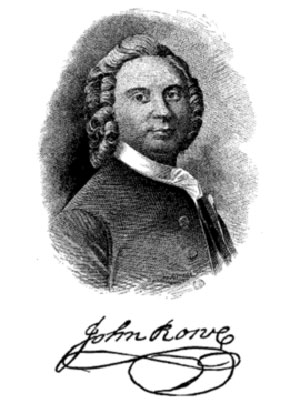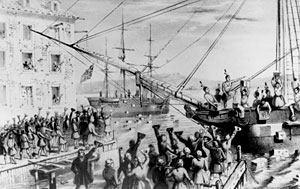
John Rowe - Boston Tea Party Rebel
Return to Exeter People Menu
It could be argued that this son of Exeter was one of the principal instigators of an event that was a turning point in history, which created the United States of America.
Born on 16 November 1715 in Exeter, to Joseph and Mary Rowe, John Rowe was one of three brothers who left the city, as a young man, for that long and hazardous voyage across the Atlantic to the English colony of Massachusetts. It is not known when he arrived in Boston, but it is known that he was a member of the St John's Lodge of Freemasons in the city by 1840. Nine years later he became the Master of the Lodge and by 1768 he was the fifth Provincial Master of Masons.
He married Hannah Speakman in 1743 and settled down as a merchant amassing a considerable amount of property including Rowe's Wharf which he purchased in 1764. Rowe's Wharf is now the site of one of Boston's most desirable water front developments. Chauncy Street was originally named Rowe Street, and he named Exeter Place in memory of his city of birth. The address would become the residence of Alexander Graham Bell in 1876.
Rowe objected to what he considered were punitive English taxes and would try to avoid them at all costs, occasionally engaging in a little smuggling. By 1760 he was one of the fifty most prominent citizens and merchants who petitioned the General Court claiming that officers of the Crown were using money belonging to the Province for their own purposes. Right through the 1760's John Rowe was involved in Colonial politics, trying to establish the rights of the colonial merchants against the Crown.
It was in 1773 that the action that would start the American Revolution and lead to the formation of the United States took place. John Rowe was 58 years old when he became a part owner, along with Samuel Adams and Hancock, of the vessel Eleanor, under the command of Captain Bruce. The vessel had brought a consignment of tea from England much to Rowe's consternation "I would Rather have Lost five hundred Guineas than Captain Bruce should have taken any of this Tea on board his Ship." Objecting to the tax imposed on the tea by the English authorities, Rowe wanted to prevent the landing of the cargo, and thus having to pay.
At a meeting, on the afternoon of the 16 December 1773 in the Old South Church, Boston, attended by many distinguished citizens and merchants, Captain Roach reported to the crowd that he had requested, from Governor Hutchison, permission to sail his ship without landing the tea, but was refused.
John Rowe then addressed the assembled audience with the immortal words "Who knows how tea will mingle with salt water?" to be enthusiastically applauded by the assembled throng. He demanded that the ship be given permission to sail without landing the tea.
The Tea Party
When the meeting closed, a group of Boston men disguised as Mohawk Indians boarded the Dartmouth, Beaver and Eleanor, carried the casks of tea onto the deck, ripped them open, and poured the contents into the harbour, a task that lasted through the night. It is estimated that 45 tons or 342 casks of tea were "mingled with salt water." It is not certain if Rowe was amongst them, but it is certain that his words provoked the action.
Even though in February 1775, the British Government repealed the hated taxes it was too late, and the American Revolutionary War broke out the same year, leading to the loss of the American Colonies by Britain and the birth of the United States.
John Rowe and his wife Hannah had no children but they adopted a daughter and cared for a niece. His brother Jacob has living descendents in the United States. John Rowe died on 21 February 1787, to be buried in Trinity churchyard; if John Rowe had not left Exeter for the American colonies, there would not have been a United States of America in the form we know today, and perhaps he may have been buried in Trinity churchyard Exeter.
 John Rowe
- born in Exeter.
John Rowe
- born in Exeter.
 A 19th-century illustration of the
Boston Tea Party.
A 19th-century illustration of the
Boston Tea Party.
│ Top of Page │